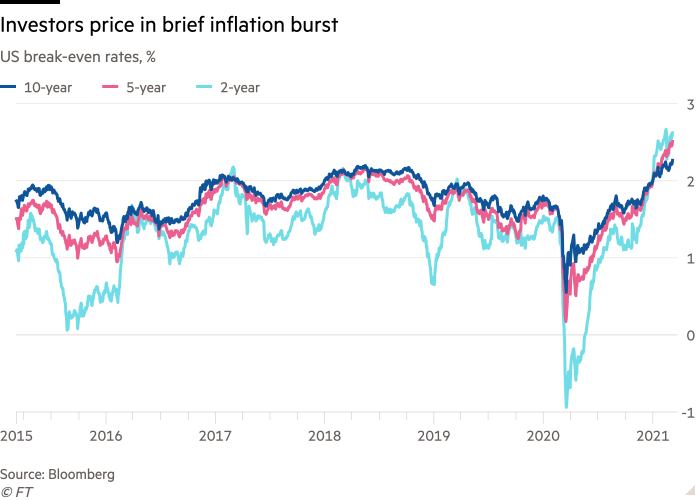Some economists, including former Treasury secretary Lawrence Summers, have argued that the next impending injection of fiscal stimulus in the US will generate destabilising inflationary pressures. But investors are unconvinced.
The US break-even curve, which tracks investors’ forecasts for inflation, has flipped upside down, with short-term rates eclipsing their long-term counterparts.
This previously happened on a sustained basis in 2008, during the global financial crisis. The two-year break-even rate, which is derived from US inflation-protected government securities, now hovers at 2.7 per cent, while the five-year gauge recently hit 2.5 per cent. The 10-year rate has lagged slightly behind, at 2.3 per cent.
That suggests that even despite the $1.9tn rush of fiscal stimulus recently approved by Congress, investors think any pick-up in inflation will rapidly fade.
“The break-even market is pricing in some risk the Federal Reserve will be able to engineer inflation to overshoot its target in the near term,” said Tiffany Wilding, a US economist at Pimco. “[But] there is very little risk of the type of 1970s-style outcomes that some economists and market participants have been alluding to.”

Market measures of inflation expectations, which are closely watched by monetary policymakers, have accelerated since the start of the year, as investors brace for a more robust economic rebound following the passage of the Biden administration’s relief programme.
While policymakers and market participants are aligned that the coming months will bring a swift pick-up in consumer price increases, views diverge sharply about the durability of the move.
Jay Powell, Federal Reserve chairman, has joined Janet Yellen, Treasury secretary, in playing down concerns.
Powell recently argued that any jump in inflation would be “neither large nor sustained” and underscored that the economy is still a long way off from the US central bank’s goal of average 2 per cent inflation. Its favourite gauge, the core personal consumption expenditures price index, currently languishes at 1.5 per cent.
Gregory Daco, chief US economist at Oxford Economics, is also of the view that inflationary pressures will mount this year, before ebbing away.
“The most likely outcome is that after a spring peak, inflation will fall back while remaining above 2 per cent for longer than at any other time over the past decade,” he said. “By longer run historical standards, inflation is still set to remain relatively muted and a long way from spiralling out of control.”

Even economists at Morgan Stanley — who have pencilled in an above-consensus 7.3 per cent economic expansion this year and see sustained upward pressure in healthcare costs, house prices and those for some goods — acknowledge that inflation more broadly will be “transient”.
They predict that core PCE will peak at 2.6 per cent on a year-on-year basis by April or May, before settling around 2.3 per cent by the end of this year and throughout 2022.
Despite the temporary nature of these expected consumer price increases, the prospects of higher inflation and the Fed potentially moving forward the timing of its interest rate adjustments has hit the $21tn market for US government debt hard.
Trading conditions seized up last month as prices plummeted and yields rose sharply. The 10-year note now trades just shy of its one-year high, at 1.53 per cent, and strategists believe it is heading higher from here.
Credit Suisse’s Jonathan Cohn now expects yields on the benchmark bond to rise to 1.9 per cent by the end of the year, having initially forecast 1.6 per cent. Goldman Sachs, Société Générale and TD Securities have also made similar revisions recently.
https://ift.tt/2OMsFvq
Business
Bagikan Berita Ini














0 Response to "US bond market signals expectations for shortlived burst of inflation - Financial Times"
Post a Comment